
views
- If their apology seems sincere, acknowledge it and thank them, even if you aren’t ready to move on yet.
- Call them out on their apology if it doesn’t seem genuine. Insincere apologies are often vague and deflect responsibility.
- Let the other person know if you still need some time to process what happened, or if you’re ready to forgive them and move on.
Identify if their apology is sincere or fake.
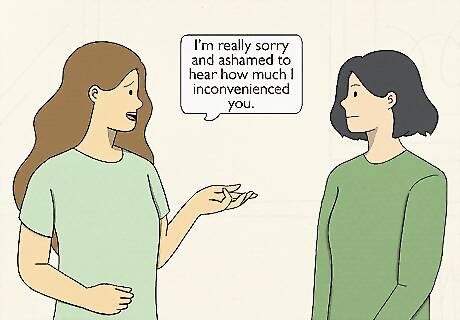
Sincere apologies are rooted in accountability and making amends. See if the person expresses how badly they feel for hurting you, admits how they messed up and how their mistake affected you, and looks for ways to make the situation right—these are all key signs that the apology is genuine. Insincere apologies, on the other hand, are extremely conditional. The apologizer often includes words like but or if, and they don’t actually take any direct accountability for their actions (though they might make excuses or justifications). Sincere apology example: “I’m really sorry and ashamed to hear how much I inconvenienced you. I should’ve texted you that I wouldn’t be able to pick you up, and I can only imagine how frustrated you felt when you were left hanging. How can I make this right?” Fake apology example: “I’m sorry if you’re feeling hurt or upset by this, but work got super busy and I just didn’t have time to text you.
Reject their apology if it doesn’t seem genuine.

Point out the parts of their apology that are inauthentic. Go into more detail about why you feel this way—maybe you feel like the apology invalidated your experience, or that the person isn’t taking full responsibility. Whatever the case, let them know why you can’t accept their apology. “To be honest, it doesn’t sound like you understand why I’m hurt at all. I can’t accept your apology because it didn’t really sound like an apology to begin with.” “I find it hard to accept your apology when all you’ve given me are a bunch of excuses.” You can always ask them to apologize to you again later on. Say something like “I’m willing to talk about this more after you’ve put a little more time and thought into why you’re sorry.”
Thank them if their apology seems authentic.
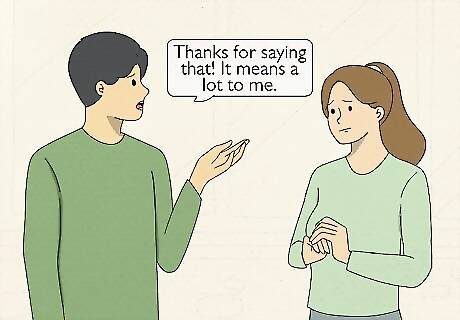
It’s important to acknowledge the apology, even if you don’t accept it. When someone really messes up, it takes a lot of strength and humility to genuinely admit a mistake. Even if you aren’t ready to make amends, tell the person that you acknowledge what they’re saying and that you appreciate their apology. “Thank you for apologizing—I really appreciate it, even though I’m still hurt. I need a little time to really process everything that happened.” “Thanks for saying that! It means a lot to me. I appreciate how much time and thought you’ve put into this situation.”
Express yourself using “I-statements.”
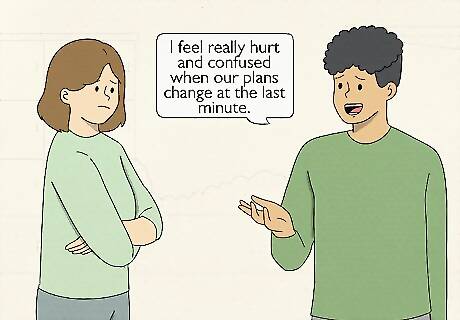
“I-statements” help you own your feelings and experiences. Start your sentence with I rather than you, since you shifts the blame to the other person and may put them on the defensive. Take time to explain what you’re feeling, what your feelings are related to, why you’re experiencing those feelings, and how things can improve in the future. This way, the apologizer gets a really clear understanding of your thoughts and perspective. “I feel really hurt and confused when our plans change at the last minute. It makes me feel like my time isn’t valuable or important. I would like to get a bigger heads up if our plans change in the future.” “I feel really betrayed and embarrassed when people talk about me when I’m not around, and it makes me struggle to trust the people I work with. If I’ve done something upsetting or annoying, I would prefer to be told directly.”
Request some space if you need time to process things.
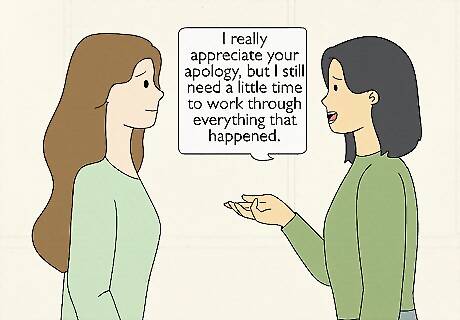
It’s okay if you haven’t completely healed from what happened. Societal conventions tell us that it’s okay is the best answer for any apology—but in reality, it’s more than okay to admit that you need more time to reflect and heal. Take a moment to acknowledge their apology while also expressing your need for space. “I really appreciate your apology, but I still need a little time to work through everything that happened.” “It means a lot to hear you say that, but it’s going to take some time before I can trust you again.”
Set boundaries for the future.
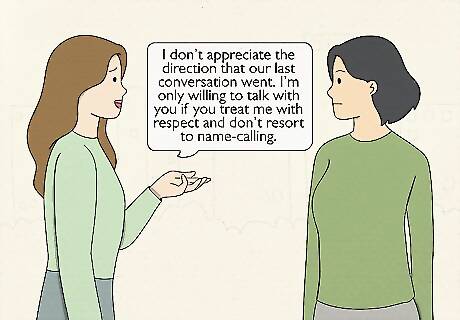
Let the person know what you do (or don’t) need from them going forward. Explain your boundaries clearly: what behavior of theirs made you uncomfortable, and what can they do in the future? Express your needs as clearly as possible so there’s no chance for miscommunication. Sharing your boundaries may seem a little intimidating at first, but don’t worry—the more you practice asserting yourself, the easier it gets. “I don’t appreciate the direction that our last conversation went. I’m only willing to talk with you if you treat me with respect and don’t resort to name-calling.” “I don’t feel comfortable lending you money when you haven’t paid me back in the past. Please don’t ask me to spot you for things in the future.” Pay attention to how the person responds to your boundaries in the coming days, weeks, and months. If they continue to ignore them, it’s okay to distance yourself and cut ties.
Look for ways to prevent the same issue in the future.
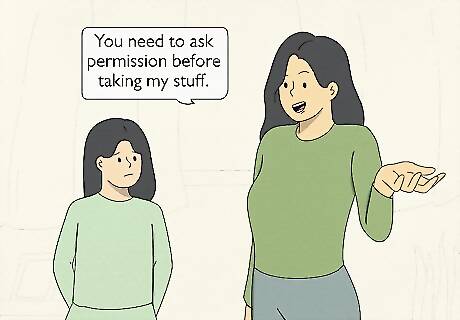
Treat the conflict as a learning opportunity. Take a closer look at the situation in question with the other person. What mistakes were made, and how can these mistakes be avoided from now on? Work with the apologizer to find a compromise or solution that leaves you both feeling content and valued. If your roommate makes a lot of noise when they get up in the morning, you could request that they use a softer alarm clock tone. You could also buy a white noise machine to help block out the extra sound. If your sibling borrowed some of your clothes without asking, establish that they need to ask permission before taking your belongings. You might also compromise by borrowing one of their clothing items at the same time they borrow one of yours.
Keep your cool throughout the conversation.
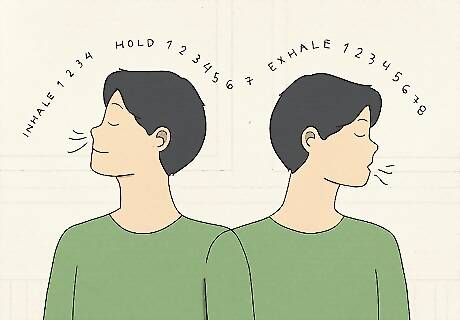
Try the 4-7-8 breathing technique if you start feeling stressed. Your hurt feelings are completely valid and understandable, but it’s hard to have a productive conversation when you’re feeling frustrated. Instead, try inhaling for 4 seconds, holding your breath for 7 seconds, and exhaling for 8 seconds. It can also help to ground yourself by focusing on what you’re physically touching (like your feet on the floor or your hands on your hips). You can also: Think about what you want to say in your head before saying it out loud Excuse yourself from the conversation and get some air Visualize something relaxing and soothing
Forgive the person if you feel ready to do so.

Forgiveness can be a freeing experience, but it’s a very personal choice. Try to view yourself as the “hero” in your own life. At the end of the day, you’re the only person who can “rescue” yourself from the pain and hurt that this other person caused. By giving yourself permission to forgive someone, you’re also giving yourself permission to be more resilient and self-reliant. It can help to demonstrate your forgiveness in a physical way, like shaking the person’s hand after your conversation.
Show empathy if they continue to apologize.
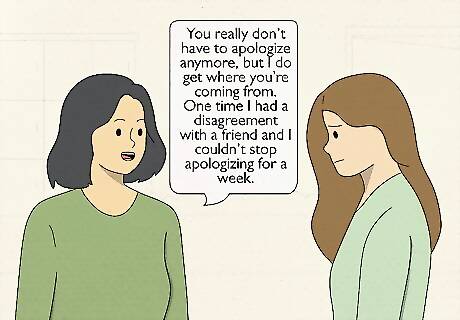
Try to relate with the other person’s experiences. Empathy is all about putting yourself in someone else’s shoes and really relating to their experiences. If someone can’t stop apologizing to you for what they’ve done, try to empathize with them. For instance, you might mention a time that you apologized profusely for something, which may help the other person feel heard and understood. “You really don’t have to apologize anymore, but I do get where you’re coming from. One time I had a disagreement with a friend and I couldn’t stop apologizing for a week.” “Please don’t worry! As someone who’s done their fair share of apologies, I don’t want this to be weighing on you.”
Focus on healing and moving on from the issue.

Practice self-care and give yourself plenty of time to recover. Remind yourself that it takes time to heal from a tough, hurtful situation—it’s not something that can be done overnight. Take each day one step at a time, and try to accept the reality that it might take you longer than expected to feel better. Here are some easy ways to take care of yourself as you heal: Aim to get 30 minutes of exercise each day Practice gratitude regularly Meditate and try breathing exercises Reach out to friends and loved ones



















Comments
0 comment